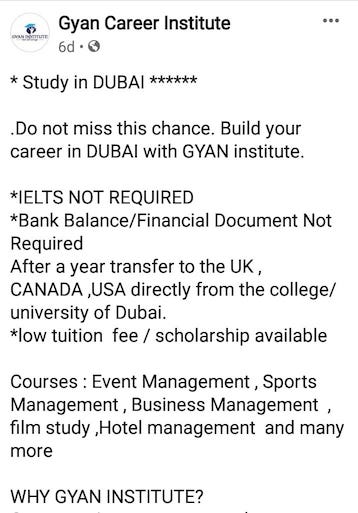Migrant students left in the lurch in Dubai’s ‘free zone’ education
The promise of a work permit and an abundance of part-time job opportunities lure students to pay steep fees at the many universities and institutions in Dubai’s free zones
The pandemic has impacted the lives of many migrant workers and businesses across the Gulf. Now, an increasing number of students enrolled in institutions in Dubai Knowledge Park and Dubai International Academic City, including Murdoch University and Nest Academy of Management Education (NAME), are struggling to pay for their accommodation, food, or a ticket home.
Students Migrant-Rights.org spoke to, mainly from South Asia, complained that promises made by educational ‘consultants’ back home were not met, but also allege that the institutions provided no relief on payment of tuition or hostel fees for the students, nor checked on those left stranded during the lockdown.
The arrangement with the institutions, which is also prominently advertised in their prospectus, is that students pay only a part of their tuition and visa fees upfront. Their visa would then allow them to work part-time within the free zone and repay the fees in instalments over their period of study.
However, job losses and partial or total shutdown of some sectors have denied students of this option, leaving them with large debts they are unable to repay.
Many of the students do not live on campus and had chosen cheaper and more crowded accommodations alongside other migrant workers elsewhere. Many were forced to default on their rent payments as well.
For three trimesters, the fee is about US$15,000 at Murdoch University and at NAME, the starting fees are approximately US$22,000 for a four-year programme with a ‘pathway’ to education in the UK, which students say never materialised. They also shared a photograph of the facility, and said, “this is just a third-floor apartment with no infrastructure.”
In addition to the steep fees, according to documents reviewed by MR, students also have to pay annual visa renewal fees of US$1100 to these institutions.
The expenses in the first few weeks of arrival pile up as they are unable to work until their residence ID is issued, which could take over a month at times.
While some courses require an IELTS certification, most others have no admission criteria. “We just paid the first instalment of fees to the consultancies and a commission of US$1000, though some of my friends didn’t pay that commission,” according to one student who enrolled in February 2020, just a month before the pandemic hit the region.
“I won’t find a job and I can’t afford to live here, I have to go back home. But I have no money.”
A young mother who left behind her family to pursue a college degree in Dubai took out a bank loan of close US$6000 on 15% interest that she still has to pay back when she returns home – without a degree and in deep debt. The university has ignored her request for a refund. Her family continues to pay the interest on her behalf while she remains stranded in the UAE.
Another student who has paid close to US$6500 so far says he wouldn’t mind staying back if he could continue to work and study, but with not enough job opportunities available, he would prefer to defer his education and return home for now.
 The families of the students who have already spent a bulk of their resources or savings on education fees, and now with their own earnings severely affected by the crisis, are unable to help their relatives sustain themselves in Dubai or cover the costs of repatriation.
The families of the students who have already spent a bulk of their resources or savings on education fees, and now with their own earnings severely affected by the crisis, are unable to help their relatives sustain themselves in Dubai or cover the costs of repatriation.
Pre-arrival, the students had little or no interaction with the university or academies, only with the consultants.
The consultancy some of the students used published new advertisements as recently as a week ago (see photo) seeking applicants to study in Dubai, with impossibly attractive admission criteria — i.e., none at all. There are several Facebook pages as well that advertise studying in Dubai, all providing similar terms of enrolment.
One of the driving factors for students to choose education in Dubai free zones is the opportunity to be able to work while studying. With that option no longer tenable, they are unable to continue with their education.
(Migrant-Rights.org reached out to both Murdoch University and NAME for comments but received no response.)




